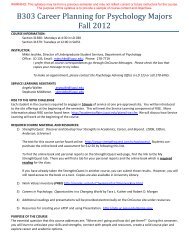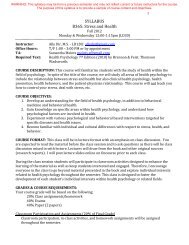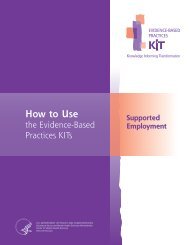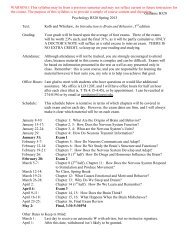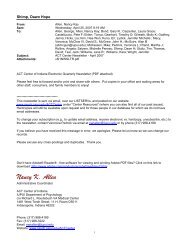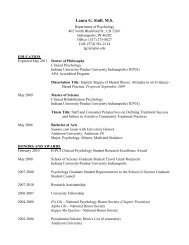Supported Employment: Training Frontline Staff - SAMHSA Store ...
Supported Employment: Training Frontline Staff - SAMHSA Store ...
Supported Employment: Training Frontline Staff - SAMHSA Store ...
You also want an ePaper? Increase the reach of your titles
YUMPU automatically turns print PDFs into web optimized ePapers that Google loves.
Examples of positive statements:<br />
You’ve shown some real determination by<br />
going out and getting a new job each time<br />
you lost an old one.<br />
I understand that you had to leave work early<br />
because you found the noise too loud to<br />
bear. I really think you were very responsible<br />
in talking to your supervisor about your<br />
difficulties before going home.<br />
In addition to pointing out positives, employment<br />
specialists can elicit positive statements from<br />
consumers about themselves. Examples of<br />
questions to ask to elicit positive statements:<br />
Can you tell me about some of the things that<br />
you think you did really well in the last job that<br />
you worked<br />
You’ve mentioned a few things that you are<br />
unhappy about in terms of your recent job<br />
performance. What are your strengths, and what<br />
do you do best at this job<br />
Express empathy<br />
Many consumers report that the faith and caring<br />
of their employment specialist was critical to their<br />
vocational success. One way to communicate that<br />
you care about consumers you serve is through<br />
expressing empathy. Empathy involves conveying<br />
to consumers that you understand and feel what<br />
their experience is like. Empathy demonstrates an<br />
emotional understanding of another person and not<br />
just a factual understanding.<br />
Typically, many consumers have experienced a<br />
range of setbacks in the process of pursuing their<br />
personal goals, and the memories of these “failures”<br />
may interfere with pursuing their vocational goals.<br />
In addition, consumers often experience a variety of<br />
obstacles to success in the workplace, including the<br />
following:<br />
• Responding to criticism;<br />
• Dealing with unclear assignments;<br />
• Arranging for reasonable accommodations for<br />
their mental illness; and<br />
• Concern about the adequacy of their job<br />
performance.<br />
Empathizing with the difficult emotions consumers<br />
have experienced is a powerful way for you to show<br />
consumers that you care and to facilitate the human<br />
connection that is critical to providing effective<br />
SE services.<br />
Sometimes expressing empathy may lead to<br />
problem-solving, but not at other times. Regardless<br />
of whether concrete steps are identified to deal<br />
with the feelings, showing empathic understanding<br />
facilitates the working relationship.<br />
Examples of empathic statements:<br />
• How difficult! How painful!<br />
• How wonderful!<br />
• How irritating! What a disappointment to lose<br />
that job after working so hard to get it.<br />
• What a mess! How confusing to expect to do one<br />
job and to come in and be assigned a different<br />
task!<br />
• You sure have put up with a lot!<br />
Support consumers in their efforts<br />
to take personal responsibility<br />
You can help consumers in their effort to take<br />
personal responsibility for health and life choices in<br />
these ways:<br />
• Eliciting consumers’ preferences by using openended<br />
questions;<br />
• Respecting consumers’ preferences; and<br />
• Avoiding excessive advice.<br />
• The stigma of mental illness;<br />
• Socializing with coworkers;<br />
Module 34 10 Job Assessment Supports and and Collaborations<br />
Job Finding



